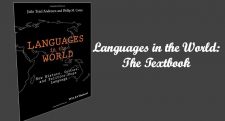Love and Linguistics II
Note: This post is part of a series about me and my work. You may wish to read first Love and Linguistics I.
Now to answer the first question people often ask me: How is that I am both a professional linguist and a romance writer?
The very question suggests that the combination is somehow odd. If I were a formalist syntactician who also writes cerebral murder mysteries, I would be confirming categories, not contesting them. It seems to some people that a high-brow, neck-up academic and a low-brow, neck-down romance writer don’t go together.
But for me they do and for 3 reasons:
- I do not believe in the emotion-intellect continuum, such that the farther you are down the emotion side, the less intellectual you are, and the farther you are down the intellect side, the less emotional you are. This is a version of the old Cartesian dichotomy between reason and emotion, which posits these two cognitive states as mutually exclusive.
Neuroscientist Antonio Damasio, well known for Descartes’ Error, among other books, has shown that emotions play a central role in social cognition and decision-making. They support proper mental functioning and are not antithetical to it.
In What Emotions Really Are, philosopher Paul Griffiths puts a further spanner in the works by demonstrating that the English word emotion unites different classes of psychological states that do not belong together, two of which are:
i. so-called affect programs which involve short-term salient cases of responses such as surprise, anger, fear, disgust, sadness/grief and happiness/joy;
Note: These are the five emotions in the wonderful movie Inside Out.
ii. and the higher cognitive-motivational complexes such as embarrassment, loyalty, revenge, envy, shame, guilt, jealousy, and love that are perceived to incur a kind of long-term cost for having them.
Griffiths’ point: the way the word emotion is used in English is incoherent, which from my POV makes sorting out what counts as ‘emotion’ and what counts as ‘intellect’ even more difficult. It takes a good deal of intellect to carry out a good revenge. The Count of Monte Cristo comes to mind.
It does not feel odd or contradictory for me to write passionately and intelligently about language and to write passionate and intelligent romances. In my mind and my experience, passion and intelligence are not mutually exclusive but rather mutually supportive.
- My aesthetic taste is for flesh, lots of it. I like the Italian Renaissance painters Titian and Rubens. I don’t connect with emaciated Giacometti statues.
Titian Venus and the Lute Player
Giacometti Three Men Walking
It’s no surprise that my reading taste would run toward the full-bodied narratives found in romance novels. Currently I’m into BBW (Big Beautiful Women) shapeshifter novels that feature curvy women and the werewolves, werebears, and werepanthers who love them.
My sense of myself is the opposite of diet guru Richard Simmons’ wisdom “Inside every fat woman is a thin woman trying to get out.” I’m not BBW, but inside me there is a very fat woman, and I let her out as often as I can. If I could sing (which I cannot), I’d be belting out torch songs in smoky lounges or Wagnerian Lieder at the Met.
When it comes to linguistics, I go for a full-bodied approach here, too.
Formalist, Cartesian-inspired, Chomsky-inspired syntactcians analyze sentences in isolation. These sentences are not responses to a situation, nor do they in turn cause a situation. This approach to linguistics, which once prevailed in all departments of linguistics in the US, cannot explain why someone says this, that, or nothing at all.
Me, I want to know why someone says this or that, and I know that silence can be meaningful, too. In other words, I study language in the fullness of its historical, culture, political, and neurological context, with brains fully embodied and bodies fully embedded.
-
I think the romance is an art form, as high an art form as any other, and therefore not, by definition, low brow.
It may be the case that my particular novels, as well as many of my fellow romance writers, do not pass some kind of high-brow test, if there is one. I’m simply saying that the romance novel is not, by definition, low brow. It has as much potential for high art as any other narrative form.
Categorised in: Language, Love
This post was written by Julie Tetel Andresen
You may also like these stories:
- google+
- comment





